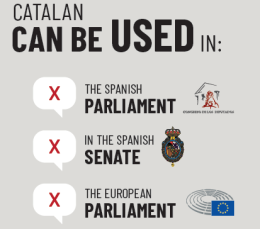Plataforma per la Llengua has considered the report published on Wednesday by the Council of Europe's Committee of Experts of the European Charter for Regional or Minority Languages on compliance with the Charter in Spain. Having analysed the document, the Catalan NGO has once again urged the State and autonomous community authorities to comply with the Charter and the experts' recommendations and apply them, despite previous repeated failures to do so. The Spanish State ratified the Charter in 2001 and has been breaching it continually every since.
The Council of Europe recognises the unity of the Catalan language in the sense that it considers that the same official language is used in Catalonia, the Valencian region and the Balearic Islands and, for the first time, refers to it as Valencian/Catalan, when it had previously referred to them separately. It once again recommends that the Judicial System Act is amended to guarantee the use of Catalan in judicial procedures if one of the parties so requests, which is not always possible today. This recommendation has been repeatedly made before but no Spanish legislative body has instigated action to comply with it.
Along the same lines, the European experts once again demand, as a recommendation for immediate application, that the State authorities use Catalan in Catalonia, the Valencian region and the Balearic Islands. During the experts' visits to Barcelona and Valencia, Plataforma per la Llengua informed the committee that ministerial job descriptions demonstrated that no civil service vacancies in Catalan-speaking territories required Catalan skills, and they were considered a merit for fewer than 2% of vacancies.
In the Balearic Islands, the report positively values an increase in Catalan in education, following the repeal of the trilingualism decree known as the TIL, and in the region's cultural, social and business life. Despite this and the legal changes since the government there changed in 2015, little progress has been made on speakers' rights. It also considers it is necessary to guarantee the interests and presence of Catalan-speakers in the media and increase the use of Catalan in health facilities.
The report draws similar conclusions for Catalonia, where it notes a decline in attention in Catalan at health centres. This information is confirmed by the Catalan NGO's analysis that the presence of the area's native language in the public health system is declining. In fact, the previous report said that the recommendations concerning the health service were being complied with, but now the rating falls to "partially complete". However, Catalonia is the only territory meeting the Charter's commitments concerning the media and education. The report mentions that the Educational Quality Act known as LOMCE, of 2013, makes language immersion - the system of teaching all lessons except for foreign languages in Catalan - difficult.
In the Valencian region, the CELRoM report positively values the language changes in the media thanks to the appearance of ÀPunt, but criticises the new Valencian Education Act for contravening the Charter by removing the possibility of studying under language immersion.
Outside the territories where Catalan is the official language, the Council of Europe experts urge the recognition of Catalan as a sign of the richness of the region of Murcia, where it asks for policies to protect it, promote it, allow it to be studied in the Carche region, and have it included in the region's Statute of Autonomy. They also make this recommendation as a matter of urgency, for the Statute of Aragon.
Paradoxically, the State, which has the right to reply to the report in a document which is then attached to it by the Council of Europe, denies any kind of language discrimination against Catalan-speaking citizens and demands proof, even though many instances of such discrimination have been denounced and proven by Plataforma per la Llengua. The Catalan NGO reminds those concerned that it has published details of such cases on numerous occasions, as have the media many times.
Finally, this document, which is produced very three years, also criticises the legal imposition of Spanish in labelling and asks that product safety instructions should be allowed in Catalan.
After evaluating the text, the President of Plataforma per la Llengua, Òscar Escuder, considers that "the Spanish parliament should urgently put forward an amendment to the Judicial System Act. This would force the Spanish socialist party (PSOE) to change its position to comply with the recommendations of this European body" considering it has always refused to amend the Act with regard to language. "The report indicates that Pedro Sánchez also has much to do in terms of language training for civil servants working in Catalan-speaking territories," says Escuder, who believes that "it has been shown that language rights are guaranteed only when public servants have the skills to understand and speak the language - otherwise they are effective only for a minority of determined people".
The president of the Catalan NGO also concludes that "if the State is incapable of complying with a Charter designed for languages in a much weaker minority position than Catalan, it shows that our language needs far-reaching legislative reform giving it real rights officially granted by the State that do not treat Catalan-speakers as second-class citizens".




